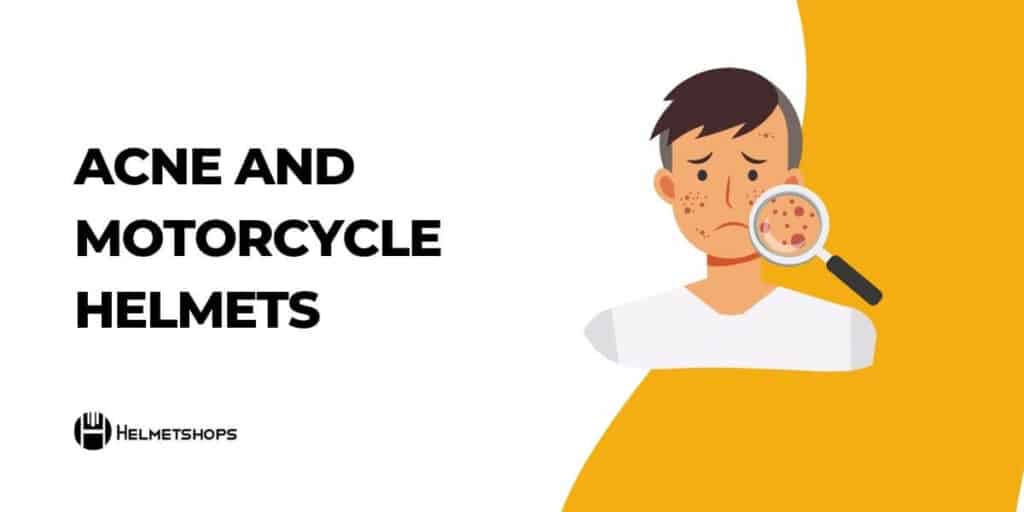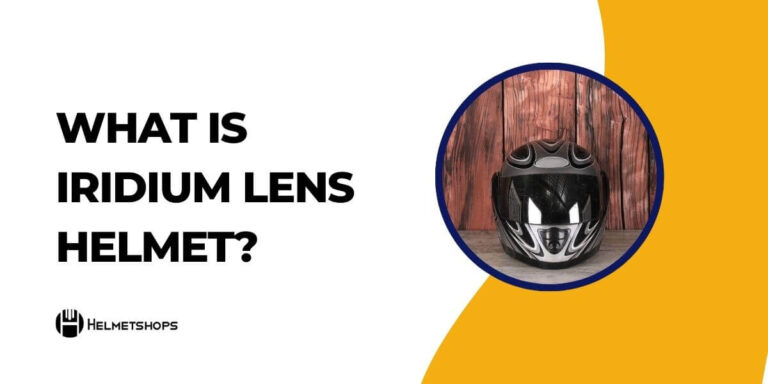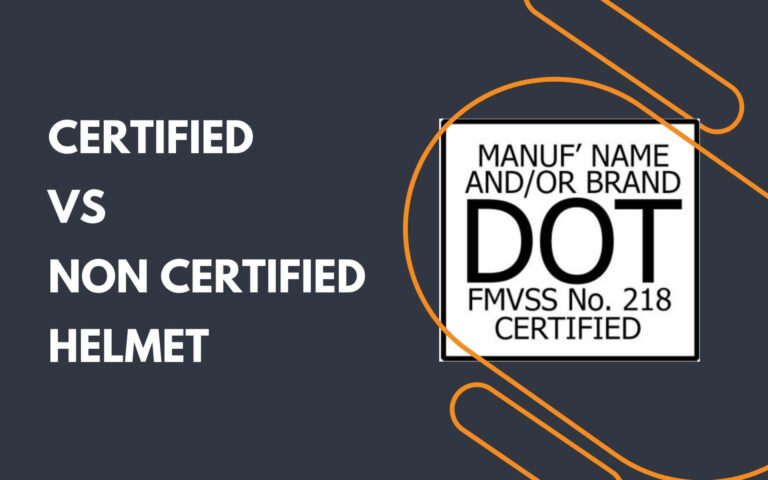Disclosure: As an Amazon Associate We earn from qualifying purchases.
Yes, motorcycle helmets can cause acne due to the prolonged use of tight-fitting helmets trapping sweat and oil on the skin’s surface. Using a motorcycle helmet is essential for protecting the head from injuries while riding.
However, wearing a helmet for a long duration can result in acne breakouts due to the sweat, oil, and heat trapped beneath the helmet. The pressure applied by a helmet creates a seal around the skin, leading to skin irritation, clogged pores, and acne formation.
If you are experiencing frequent acne breakouts, you may consider using a helmet with proper padding, cleaning your helmet regularly, using skin-friendly moisturizers, and taking breaks during long rides to alleviate pressure on the skin. It is important to maintain healthy skin to avoid potential skin problems associated with wearing a motorcycle helmet.

Understanding Acne
Can Motorcycle Helmets Cause Acne
Acne is a common skin condition that occurs when your hair follicles become clogged with oil and dead skin cells. It often appears as pimples, whiteheads, blackheads, and cysts. Although acne is common among teenagers, it can affect people of all ages.
In this section, we will examine the different types of acne, its causes and triggers, and whether wearing motorcycle helmets can contribute to the development of acne.
Definition Of Acne
Acne is a skin condition that occurs when hair follicles become clogged with oil and dead skin cells. It can appear on the face, neck, chest, back, and shoulders. Acne can be mild, moderate, or severe and can cause emotional distress, scarring, and pigmentation.
Different Types Of Acne
There are several types of acne, including:
- Whiteheads: Small, round, white bumps under the skin.
- Blackheads: Open pores, resulting in a dark, clogged pore.
- Papules: Red, tender bumps without heads.
- Pustules: Similar to papules but contain pus.
- Cysts: Large, painful, pus-filled bumps under the skin.
Causes And Triggers Of Acne
The exact cause of acne is unknown. However, several factors can contribute to its development, including:
- Hormones: Hormonal changes can stimulate oil gland production and result in acne.
- Genetics: The risk of developing acne is higher if your parents had acne.
- Environment: Exposure to pollution, heat, and humidity can trigger breakouts.
- Diet: High sugar and dairy intake can contribute to acne development.
- Medications: Certain medications can trigger acne development.
Can Wearing Motorcycle Helmets Contribute To The Development Of Acne?
Wearing motorcycle helmets can contribute to acne development, primarily if the helmets are tight-fitting and don’t allow proper ventilation. Here’s how it happens:
- Sweat and oil from the scalp and face accumulate inside the helmet, blocking hair follicles, and causing acne.
- Friction caused by the helmet against the skin can also worsen acne.
- Chemicals and detergents used to clean helmets’ inner lining can irritate sensitive skin and cause acne breakouts.
To prevent acne formation due to helmet usage, ensure that:
- You clean your helmet regularly with gentle detergents.
- You wear a clean helmet liner every time you wear the helmet.
- You choose helmets that fit properly and allow adequate ventilation.
- You use acne-safe skincare products.
Acne is a common skin condition that can occur due to various factors, including helmet usage. Understanding the types, causes and triggers of acne can help maintain healthy, acne-free skin.
Understanding Motorcycle Helmets
Are motorcycle helmets responsible for acne breakouts? This is a question that has been asked by many motorcycle enthusiasts who also have acne-prone skin. While motorcycle helmets are important for safety on the roads, they could also contribute to the development of acne on the skin.
We will be discussing the key points to understanding motorcycle helmets and how they could lead to acne breakouts.
Introduction To Motorcycle Helmets
- The primary purpose of motorcycle helmets is to protect the head from injuries during accidents.
- Wearing motorcycle helmets is mandatory in many countries, and failure to wear one could result in legal consequences.
- In addition to safety, motorcycle helmets can also contribute to fashion and style.
Different Types Of Motorcycle Helmets
- Full-face helmets: These helmets provide the most coverage but can be quite heavy and bulky.
- Half helmets: These helmets cover only the top of the head and leave the face and chin exposed.
- Modular helmets: These helmets are a mix of full-face and half helmets, and the front can be lifted when not needed.
- Off-road helmets: These helmets are designed for dirt biking and cover the entire head and face.
Materials Used In Making Motorcycle Helmets
- Polycarbonate: This material is inexpensive, lightweight, and impact-resistant, making it a popular choice for helmet manufacturers.
- Fiberglass: This material is lightweight, sturdy, and comfortable but can be costly.
- Carbon fiber: This material is the lightest and strongest but also the most expensive, making it a popular choice for high-end helmets.
How Motorcycle Helmets Can Contribute To The Development Of Acne On The Skin
- Wearing helmets for long periods can cause heat and moisture buildup, leading to clogged pores and acne.
- Sweat and oil from the skin can mix within the helmet and provide an environment for bacteria growth, further exacerbating acne breakouts.
- Tight-fitting helmets can cause friction and pressure on the skin, leading to irritation and acne breakouts.
Motorcycle helmets are crucial for safety on the roads, but they could also contribute to acne breakouts on acne-prone skin. Therefore, it is essential to maintain a clean and hygienic helmet, take regular breaks when riding, and use products suitable for acne-prone skin.
With these precautions, motorcycle enthusiasts can enjoy their rides while also taking care of their skin.
Preventing Acne Caused By Motorcycle Helmets
Riding a motorcycle can be a thrilling adventure, but have you ever noticed acne after a long ride with your helmet on? Well, you’re not alone; numerous bikers experience acne because of the sweat, dirt, and oil that accumulates on their face and helmet while riding.
This blog post will provide you with tips and strategies on how to avoid acne caused by wearing motorcycle helmets.
Tips On How To Maintain Good Hygiene While Wearing Motorcycle Helmets
Maintaining good hygiene while wearing a motorcycle helmet is critical for preventing acne breakouts. Here are some essential tips:
- Clean your helmet regularly with a damp cloth or sponge. Make sure it’s dry before wearing it.
- Wash your face with gentle soap before putting the helmet on.
- Avoid touching your face while wearing the helmet.
- Don’t share your helmet with others.
Skin Care Measures That Can Be Taken To Prevent Acne Caused By Motorcycle Helmets
Taking care of your skin is essential to prevent acne breakouts while wearing a motorcycle helmet. Here are some skin care measures that you can consider:
- Use oil-free facial cleansers to clean your face before and after riding.
- Apply a light layer of moisturizer before wearing the helmet.
- Use a non-comedogenic sunscreen to protect your skin from uv rays.
- Try using face wipes to cleanse your face while on the go.
Products That Can Be Used To Minimize Acne Breakout While Wearing Motorcycle Helmets
Several products can help reduce acne caused by wearing motorcycle helmets. Here are some products that you can consider:
- Zinc oxide-based sunscreen: Zinc oxide helps keep your skin’s oil production in check, making it less likely for acne to develop.
- Silicone-based moisturizer: This type of moisturizer is lightweight, non-greasy, and won’t clog pores.
- Acne treatment products: Several over-the-counter products are formulated to help treat acne, such as salicylic acid and benzoyl peroxide.
Frequently Asked Questions On Can Motorcycle Helmets Cause Acne
Can Wearing Motorcycle Helmets Cause Acne?
Wearing a motorcycle helmet can potentially cause acne breakouts due to the sweat and dirt that accumulates on the skin’s surface. However, proper helmet hygiene and skincare routine can prevent these breakouts.
How Can I Prevent Acne While Wearing A Helmet?
You can prevent acne while wearing a helmet by cleaning your face before and after a ride, using a moisturizer, and keeping your helmet clean and dry. Also, consider wearing a helmet with moisture-wicking material to prevent sweat buildup.
What Type Of Helmet Is Best For Preventing Acne?
A helmet with a moisture-wicking liner is the best type for preventing acne. This liner helps to keep sweat away from the skin and reduce the risk of acne breakouts. Look for helmets with removable and washable liners for easy cleaning.
Is Acne Caused By Motorcycle Helmets?
Acne is not directly caused by motorcycle helmets but the sweat, dirt, and bacteria buildup on the skin could contribute to acne breakouts. Proper helmet hygiene and skin care routines can lessen the chances of acne caused by helmets.
How Do I Clean My Helmet To Prevent Acne?
Clean your helmet regularly by wiping the interior with an antibacterial wipe. Also, use mild soap and water to wash the liners. It is essential to avoid using harsh chemicals as these can irritate the skin and worsen acne.
Conclusion
As motorcycle enthusiasts, we understand the importance of protecting ourselves while on the road. However, we cannot ignore the fact that prolonged helmet use can lead to acne breakouts. While there is no clear-cut solution to this issue, there are some precautions we can take to mitigate it.
Ensuring proper helmet fit, cleaning our helmets regularly, and maintaining good hygiene practices can all help minimize the risk of helmet-related acne breakouts. It is important to remember that each individual’s skin reacts differently, and what works for one rider may not work for another.
Putting our well-being first should be our utmost concern. It is of vital importance to prioritize our health and safety by implementing these simple measures, which will effectively prevent acne breakouts. Next time you embark on a journey, be mindful of the risk of developing acne caused by wearing a helmet. Ensure you take the essential measures to maintain a radiant and healthy complexion.




